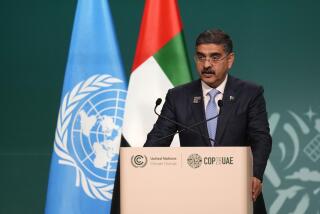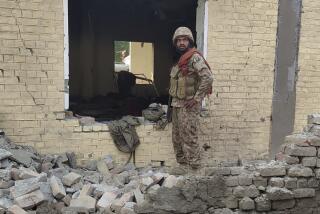Pakistan suicide bombing toll nears 100
- Share via
Reporting from New Delhi and Peshawar, Pakistan — At least 75 civilians were killed and dozens were wounded Friday when a suicide bomber detonated an explosives-laden vehicle at an outdoor volleyball game in northwestern Pakistan, police said. The attack apparently was aimed at members of an anti-Taliban “peace committee” that has been challenging the influence of insurgents, officials and town elders said.
UPDATE SHAH HASAN KHEL, Pakistan (AP) -- Pakistan volleyball game bombing toll nears 100.
The bombing took place as a crowd of more than 200 people watched a match between local teams about 20 miles south of the town of Lakki Marwat in North-West Frontier Province. The site is close to South Waziristan, where Pakistani troops have been battling Taliban and Al Qaeda fighters in recent months at the urging of U.S. leaders.
The bomber drove a double-cab pickup truck packed with 550 pounds of high-intensity explosives onto the field, which is in a densely populated neighborhood, police said. Witnesses said the ground was littered with flesh after the blast and that several bodies were damaged beyond recognition.
The force of the bomb rocked the area, destroying several nearby houses. Survivors struggled to free badly wounded victims from the rubble. Several critically hurt people were taken by car and wagon to other hospitals in Lakki Marwat district after the local government-run hospital became overwhelmed.
“Locals set up a militia and expelled the militants from this area,” Police Chief Ayub Khan told reporters. “This attack seems to be reaction to their expulsion.”
Mushtaq Marwat, an elder in Lakki Marwat, said members of the peace committee, many of whom were watching the volleyball match, had earlier received threats from militant groups operating in the volatile North Waziristan tribal region.
Analysts said the attack was part of a retaliatory campaign the Taliban has waged against the army and public since the government launched an offensive against insurgents in South Waziristan in October. It underscores the challenges ahead this year in the battle to stem insurgency along both sides of the Afghan-Pakistani border.
One of the militants’ objectives is to sow terror among the general population in hopes of putting more political pressure on President Asif Ali Zardari’s government to back down.
“The Taliban are increasingly frustrated, as you saw with this sports attack,” said Ishtiaq Ahmad, professor of international relations with Islamabad’s Quaid-i-Azam University. “They spare no opportunity to engage in pure and simple terrorism against unarmed civilians. This has the largest psychological impact.”
A second objective, analysts said, is to increase misunderstanding and distrust between Washington and Islamabad in hopes of preventing coordinated attacks from both sides of the Afghan-Pakistani border in the spring. In a few months, the snows will have melted and many of the 30,000 additional U.S. troops in Afghanistan promised by President Obama will be in place.
On other fronts, a suspected U.S. missile strike killed at least two alleged militants in a car in North Waziristan on Friday. It was the second such attack in less than 12 hours.
In 2009, the U.S. carried out at least 50 missile attacks using unmanned drone aircraft in Pakistan’s lawless Federally Administered Tribal Areas and the adjacent Bannu district. Dozens of people were killed, including Al Qaeda and Taliban commanders.
U.S. officials rarely discuss the missile strikes, which the Pakistani public views as a threat to national sovereignty and a danger to civilians. Islamabad publicly condemns the attacks, although it is widely believed that it assists with intelligence and logistical support in secret.
With time, the drone attacks have become more effective and involved fewer civilian casualties, although militants have begun altering their movements in response.
Locals said two people were killed and four were wounded in Friday’s drone attack after two missiles hit a car parked outside a residential compound. The victims’ identities could not immediately be learned.
A drone attack late Thursday reportedly hit the house of a local tribesman in Mirali Tehsil, in North Waziristan, killing seven people. Officials and family members confirmed that pro-Taliban commander Haji Muhammad Umar, 48, was among the casualties.
Umar, who signed a peace deal with the government in 2005, succeeded Nek Mohammed after the militant commander was killed in a missile attack in 2004. When the peace deal fell apart, Umar reportedly organized attacks against Pakistani security forces and NATO forces in Afghanistan.
Analysts said the relative success of a Pakistani army operation in the Swat Valley in early 2009 and in South Waziristan more recently has prompted militants to lash out against the army and soft targets.
So far, however, Pakistanis have been supportive of the government crackdown, despite the civilian casualties, analysts said.
“The people of Pakistan are absolutely united on this as something you have to get rid of,” said Shaukat Qadir, a retired brigadier general and military analyst.
In an announcement that analysts said might be a further effort to drive a wedge between U.S. and Pakistani officials, Taliban militants based in Pakistan claimed Friday that they had carried out the suicide bombing in Afghanistan this week that killed seven CIA employees in eastern Afghanistan.
The militants’ statement -- that they used a local CIA informer in an operation meant to avenge the death of a top militant leader in a U.S. missile strike -- could not immediately be confirmed.
If such claims lead Washington to openly criticize Islamabad for not doing more, a nationalist backlash could result among Pakistanis. That would undermine counterinsurgency cooperation, analysts said.
“They’re trying to create fissures,” said Ahmad of Quaid-i-Azam University. “They know that Washington already has reservations that Pakistan is pursuing one policy against Pakistan Taliban and another toward Afghan Taliban.”
Ali is a special correspondent.
More to Read
Sign up for Essential California
The most important California stories and recommendations in your inbox every morning.
You may occasionally receive promotional content from the Los Angeles Times.










